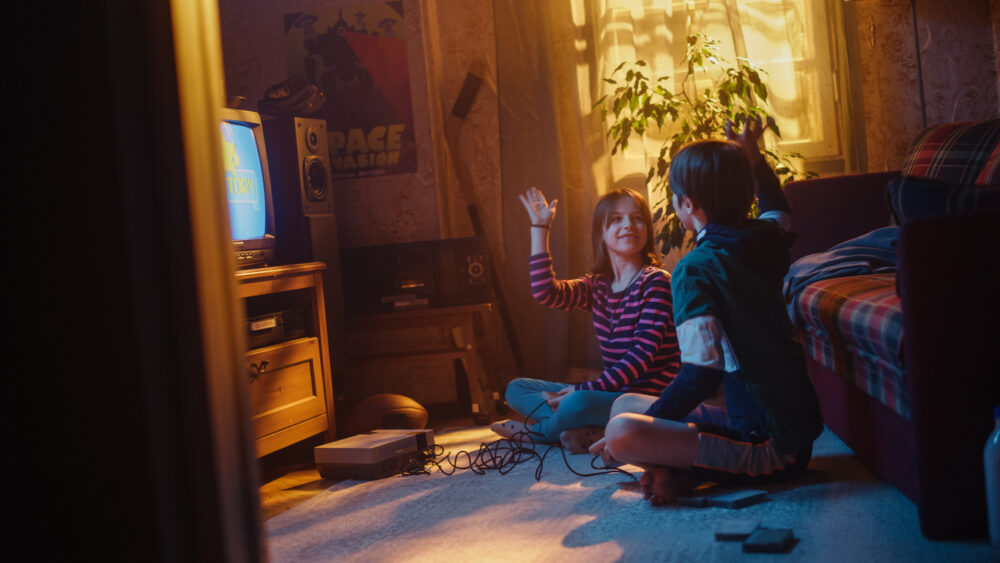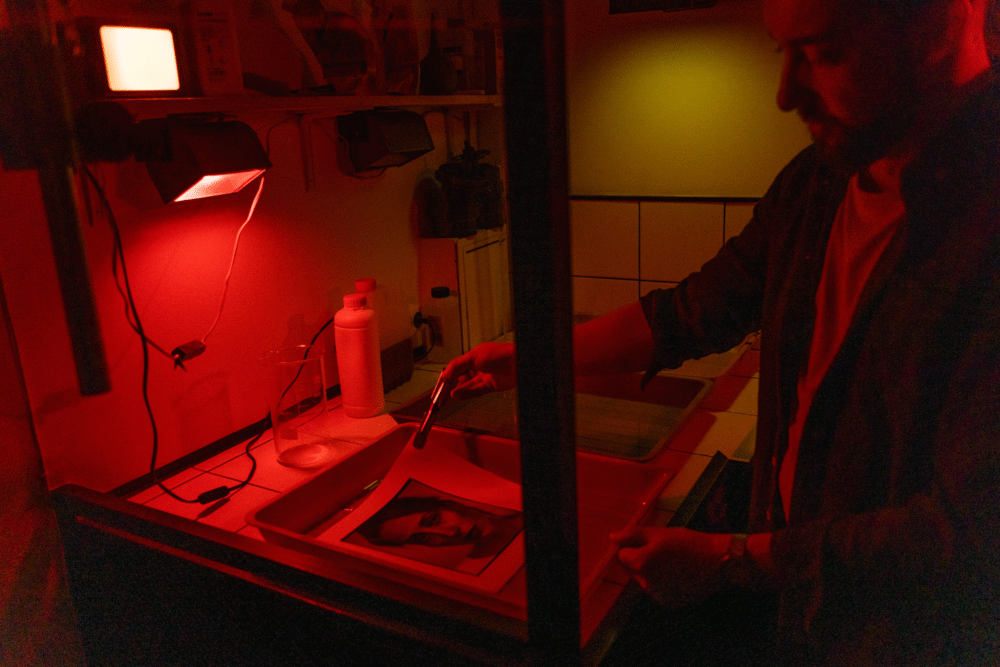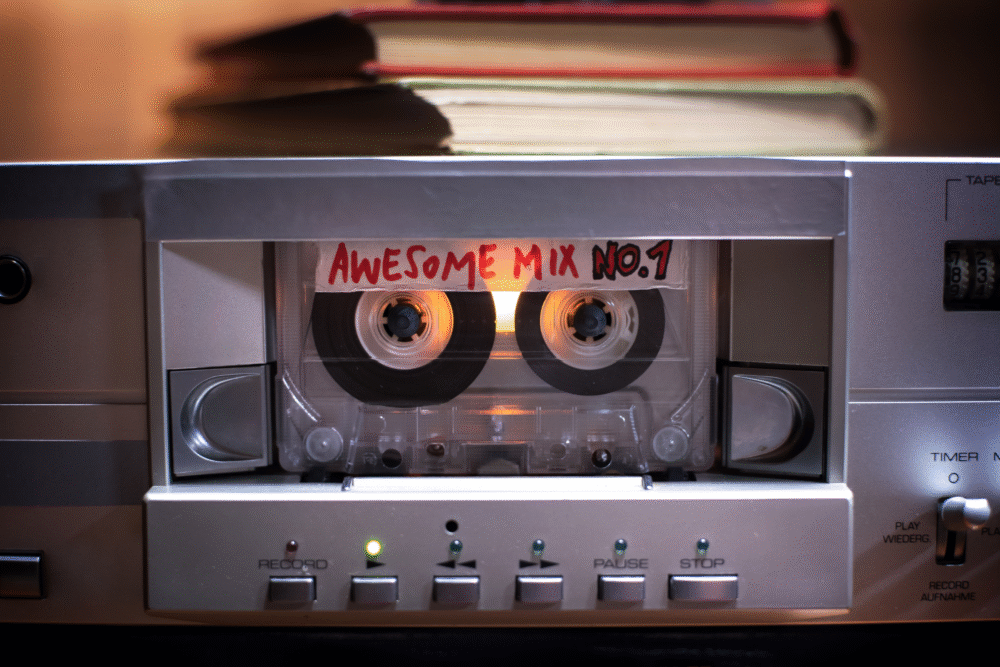They romanticize an era they never truly experienced.

For Gen Z, the 1990s aren’t a memory, but a curated aesthetic pulled from movies, TV shows, and carefully archived internet content. Despite never having lived through the decade, this generation has developed a surprising sense of nostalgia, longing for the analog comforts and cultural touchstones of a pre-digital world.
Their fascination with ’90s culture is a testament to the power of media to create a collective memory, making them miss a time they only know through a screen.
1. The tactile satisfaction of a blockbuster video store.

Before streaming services made movie night effortless, the Friday ritual of visiting a Blockbuster was a tangible experience. Gen Z romanticizes the joy of Browse aisles, reading movie descriptions on the back of VHS boxes, and the sense of discovery that came from picking out a film with friends. It was a social event, not just a transaction.
This nostalgia is a longing for a time when media consumption was a more deliberate and communal activity, free from the overwhelming paradox of choice offered by endless digital libraries. It represents a simpler way to discover and engage with entertainment.
2. A more intentional, less curated version of social connection.

The ’90s were the last decade where friendships were built and maintained primarily through in-person interaction, landline phone calls, and passing notes in class. There was no pressure to constantly perform or curate a perfect online persona. The connections were slower, more focused, and less influenced by a digital audience.
Gen Z looks back at this time with a desire for a more authentic form of social engagement, free from the constant performance and comparison that dominate social media today. They crave the depth that comes from undivided attention and genuine, unrecorded moments.
3. The sweet sound of dial-up internet connecting.

The screech and hum of a dial-up modem connecting to the internet is a sound Gen Z knows only through cultural references, yet they romanticize its symbolic meaning. It represented a slow, deliberate connection to a digital world that wasn’t always on. Accessing the web was a choice, a destination you went to, not a constant state of being.
This nostalgia is for a time when the internet was a novelty, not an all-encompassing force in daily life. They miss the anticipation of waiting for a page to load and the clear separation between the online and offline worlds.
4. A world where everyone wasn’t a content creator.

In the ’90s, the line between consumer and creator was much clearer. Mainstream media dictated culture, and individuals weren’t expected to constantly produce content about their lives. The pressure to film, edit, and post every moment simply didn’t exist. This lack of constant self-documentation is what Gen Z finds so appealing.
This longing is for a time when living in the moment was the default, not a conscious choice. They romanticize a time when private life was truly private, free from the pressure to monetize or perform for a digital audience.
5. The thrill of a live music show without a sea of phones.

Live concerts in the ’90s were about being present in the moment, experiencing the music and the crowd with your full attention. Photos were limited to grainy disposable camera shots, and people weren’t holding up their phones, recording every song. This undivided attention to the live experience is a major point of fascination for Gen Z.
They crave a less filtered and more immersive connection to the music and the artist, free from the distraction of digital documentation. It’s a longing for a communal experience where everyone is focused on the same thing: the performance happening right in front of them.
6. The aesthetic of clunky, colorful gadgets.

Gen Z is fascinated by the design of ’90s technology: the bulky, brightly colored iMacs, the transparent Game Boys, and the chunky landline phones. These gadgets, though technologically primitive by today’s standards, had a distinct personality and a tactile quality that modern, sleek devices often lack.
This nostalgia is for a time when technology was more playful and less integrated into every aspect of life. They appreciate the intentional, aesthetic design of these gadgets that stood out as objects, rather than just tools.
7. The simplicity of a television without streaming overload.

Watching television in the ’90s involved a limited number of channels and a pre-determined schedule. You had to tune in at a specific time to watch your favorite show, a ritual that created shared cultural moments and conversation. There were no algorithms, no binge-watching, and no endless scrolling for something to watch.
Gen Z romanticizes this simplicity and the communal aspect of everyone watching the same thing at the same time. They miss the shared cultural water cooler moments that are rare in today’s fractured, on-demand media landscape.
8. The freedom of not having a smartphone.

While Gen Z is the first generation to grow up with smartphones, they also see them as a source of immense pressure and anxiety. They romanticize a time when people were not constantly reachable, when getting lost was a possibility, and when information wasn’t instantly available at their fingertips. It represents a different kind of freedom.
This nostalgia isn’t for a lack of technology, but for the freedom that came with a less connected, less demanding world. They miss the mental space and physical presence that a life without constant digital notifications allowed.
9. The excitement of waiting for a photo to be developed.

The ’90s were an era of disposable cameras and film development, where you had to wait days or even weeks to see your photos. This process built anticipation and made every photo feel special. There was no instant deletion or endless selfies; each picture was a tangible moment captured with intentionality.
Gen Z, accustomed to the instant and fleeting nature of digital photos, romanticizes this delayed gratification. They miss the surprise of seeing a roll of developed film and the permanence that came with a physical photograph, which felt more like a real memory.
10. The lack of social media perfectionism.

In the ’90s, there was no Instagram, TikTok, or Twitter to create pressure to have a perfect-looking life. Teenagers weren’t worried about likes, comments, or followers. Social gatherings were just that—social, not an opportunity for content creation. The focus was on the moment, not its digital presentation.
Gen Z longs for a time when social interaction was more genuine and less performative. They see this era as a golden age of authenticity, where people were freer to be themselves without the constant, draining pressure of online validation.
11. The cultural significance of MTV’s music videos.

MTV in the ’90s was a powerful cultural force, a shared experience that shaped music tastes and visual aesthetics. The iconic music videos of the era were an art form, not just a promotional tool. Gen Z romanticizes this era when music videos were a primary source of cultural discovery, before YouTube and streaming fractured the viewing experience.
They miss the collective excitement of seeing a new video premiere and the influence it had on fashion, film, and art. It was a time when music and visuals were intertwined in a way that truly defined an era.
12. The pure escapism of a video game without online multiplayer.

Many ’90s video games were designed for single-player experiences or local multiplayer with friends gathered around the same screen. There were no online lobbies, no strangers from across the world, and no constant pressure to win online ranks. It was about pure, focused, escapist fun.
Gen Z romanticizes this simpler form of gaming, which was a more intimate and less competitive experience. They long for a time when video games were about the single-player narrative or the shared laughter with friends in the same room, without the distractions of an online community.
13. The tangible act of making a mixtape.

Making a mixtape was a significant act of love and effort in the ’90s. It required you to carefully select songs, wait for them to play on the radio, and record them onto a physical cassette tape. It was a personalized, thoughtful gift that couldn’t be instantly created or shared.
Gen Z romanticizes the intentionality and effort that went into creating a mixtape. They see it as a symbol of a deeper, more meaningful way to connect with someone through music, a stark contrast to today’s instant and impersonal digital playlists.
